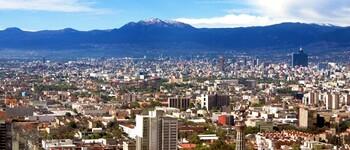Context
By 2030, 80 per cent of Mexico’s population will live in cities. Increasing urbanisation, combined with economic development, presents major challenges for the country, among them, the environmental impact. Efficient use of residential, traffic and natural areas, modern and sustainable transport systems, and a conscientious approach to using water, energy, and natural resources in the planning and development of cities and industries are essential in improving the quality of life in Mexico's cities and protecting the environment. To shape the country’s economic development in a more environmentally friendly manner, greater importance must be also placed on sustainable consumption and production. This requires close cooperation between civil society, the private sector and different levels of government. The development and local implementation of joint measures in solving environmental problems will help Mexico fulfil its international obligations such as the 2030 Agenda’s Sustainable Development Goals (SDGs).
Objective
With their improved environmental management practices, cities and businesses create an incentive for sustainable consumption, production and services.
Approach
On behalf of the German Federal Ministry for Economic Cooperation and Development (BMZ), GIZ is working with the project Urban-industrial Environmental Management II to raise the level of environmental management in Mexico’s cities and businesses. The project partners are the Mexican Agency for International Development Cooperation (AMEXCID), the Secretariat of Environment and Natural Resources (SEMARNAT), the Ministry of Agrarian, Territorial and Urban Development (SEDATU), governments at state and municipal level, the private sector and civil society. Together with these partners, GIZ aims to create green, liveable and inclusive cities as well as make consumption and production more sustainable. In this way, it actively contributes to environmental protection and identifies sustainable development opportunities for Mexico. GIZ focuses on the following three areas:
-
Environmental management in cities
The project supports the implementation of innovative models for environmental protection at municipal level in six of Mexico’s pilot cities, including in the fields of environmentally friendly mobility, wastewater treatment, waste management, sustainable tourism, air quality improvement and environmental education for the population. Successful models have been made available to communities across the country with the support of the Mexican authorities. Training of local decision-makers on environmental affairs and sustainable urban development are also part of the project activities. GIZ is currently working together with the cities of Cozumel, Puebla and Tlalnepantla. Projects are also being implemented with the federal states of Mexico and Puebla to strengthen cooperation within communities in metropolitan regions. -
Production of sustainable goods and services
In cooperation with the Mexican Government and business associations, GIZ promotes the production of sustainable goods and services to support the development of the Mexican economy in a more environmentally friendly manner. These activities include promoting eco-friendly and resource-efficient innovations in small and medium-sized enterprises (SMEs), training for businesses in environmental management and introducing environmental criteria for procurement in the public sector. GIZ also supports Mexican cities in boosting sustainable tourism and reinforces economic development in selected metropolitan regions. Together with GOPA Infra GmbH, training was provided to companies and public institutions to raise their awareness of environmental management. -
Environmental policy and civil society
Promoting a strong civil society committed to environmental policy that voices its interests and contributes to political and economic decisions will further increase awareness of environmental protection in Mexican cities and businesses. A strong civil society also enables better monitoring of the government by the population and improves transparency regarding the implementation of measures. This is why GIZ is supporting the civil society organisations involved in environmental protection. For example, it ensures that environmental projects continue when there are changes in government and supports the exchange of ideas and innovative environmental protection measures. By using social networks and other information and communications technology, GIZ increases communication between civil society and authorities on key environmental issues and ensures that the people’s interests are more accurately reflected in the actions of the authorities.
Results
Residents in the metropolitan area of Toluca suffer from increasing air pollution. In response, GIZ worked with the municipal administration, the private sector and civil society to establish a low-emission zone in the city centre. Measures to reduce energy consumption and for waste recycling, environmental education, and the introduction of bike rental systems are noticeably lowering the air pollution in the Ecozona Toluca, an area nearly three square kilometres in size. Low-emission zones are now part of the federal state of Mexico’s environmental policy programme and are being implemented accordingly in other cities as well. For example, GIZ is currently supporting the introduction of a low-emission zone in the industrial city of Tlalnepantla.
In cooperation with the Mexican Association of Industrial Parks (AMPIP), GIZ is also implementing the Competitiveness Programme of Industrial Areas through Sustainability (PROCAIS) in two industrial areas. With the support of PROCAIS, resources such as water, energy and waste can be dealt with more responsibly in industrial areas. The programme also includes measures on occupational safety and gender equality.
Twenty-one per cent of the Mexican population are between the ages of 15 and 29; however, this age group's involvement in environmental issues is particularly low. As a result, GIZ is working with civil society to motivate young people to step up their engagement with the environment. The handbook ‘Together We’re Building the Future', jointly developed by GIZ and the organisation Fondo para la Comunicación y la Educación Ambiental, aims to raise awareness among young people between the ages of 15 and 20 about educational institutions and other organisations focused on environmental issues and their importance in implementing the 2030 Agenda, thereby motivating young people to become actively involved in environmental policy.
